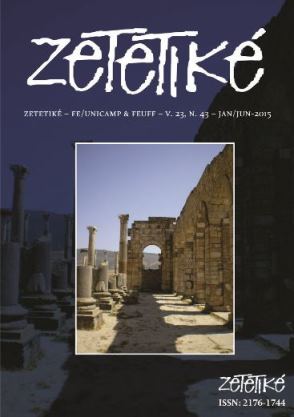Abstract
The Campinas Assessment 2010 was a challenging collective work. Throughout this work we dialogue with everyday teaching practices that were being held in the municipal school system of Campinas, as well as the thoughts of some prominent philosophers – Friedrich Nietzsche, Ludwig Wittgenstein and Jacques Derrida -, in order to generate data that allow us problematize the school education and the usual forms of assessment of learning this context.In this article, we present, in general, the set of ideas that potentiated the processes of design, development and correction of the assessment, as well as its performing context. The presentation of these ideas will be the backdrop for the comparative analytical commentary that we will do about the ways in which students who participated in the assessment deal with questions that ask them to do mainly normative uses of language - such as those made, among others, by the academic and school mathematics - and mainly allegorical uses of language, such as those made, among others, by different types of arts.
References
Austin, J. L (1977). How to do things with words. Cambridge: Cambridge University Press.
Banksy (2006). Banksy: wall and piece. London: Century.
Cohen, P. C. (1982). A Calculating People: the spread of numeracy in early America. Chicago: University of Chicago Press.
Condé, M. L. L. (2009). TECHICA/ARS e a produção do conhecimento do homem moderno. In: (Org.). Magno Moraes Mello. Ars, Techné, Technica: a fundamentação teórica e cultural da perspectiva, pp. 115-123. Belo Horizonte, MG: Argvmentvm.
Derrida, J. (1971). La dissémination. Paris: Seuil.
Derrida, J. (2008). Gramatologia. Tradução Miriam Chnaiderman e Renato Janine Ribeiro. São Paulo: Perspectiva.
Duque-Estrada, P. C. (2008). Jacques Derrida. Primeiros passos: da linguagem à escritura. In: Revista Mente, Cérebro & Filosofia. Fundamentos para a compreensão contemporânea da psique. São Paulo: Duetto. n. 12, agosto, p.49-57.
Gebauer, G., Wulf, C. (2004). Mimese na cultura: agir social – rituais e jogos – produções estéticas. Tradução Eduardo Triandopolis. São Paulo: Annablume, 1a. Edição.
Glock, H.-J. (1998). Dicionário de Wittgenstein. Rio de Janeiro: Zahar.
Haddock-Lobo, R. (2008). Derrida e o labirinto de inscrições. Porto Alegre: Editora Zouk, 2008.
Haddock-Lobo, R. (2011). Para um pensamento úmido: a filosofia a partir de Jacques Derrida. Rio de Janeiro (RJ): Nau: Ed. PUC-Rio.
Lave, J. (2003). Cognition in Pratice: Mind, Mathematics and culture in everyday life. Cambridge: Cambridge University Press.
McDonald, H. (2001). Wittgenstein, Narrative Theory, and Cultural Studies. Telos: Critical Theory of Contemporary, n. 121 p. 11-53.
Miguel, A. (2014). Is the mathematics education a problem for the school or is the school a problem for the mathematics education? Brazilian Society for Mathematics Education: RIPEM - International Journal for Research in Mathematics Education, V. 4, N. 2, pp. 5-35.
Miguel, A. (2015). Historiografia e terapia na cidade da linguagem de Wittgenstein. No prelo. Bolema.
Miguel, A., Vilela, D. S. & Moura, A. R. L. (2012). Problematização indisciplinar de uma prática cultural numa perspectiva wittgensteiniana. Revista Reflexão e Ação. Santa Cruz do Sul, v. 20, n. 2, pp. 1-26.
Moura, A. R. L., Miguel, A., Silva, L. L. M. & Ferreira, N. S. A. (2015a). Prova Campinas 2008: uma avaliação das práticas escolares em língua portuguesa e matemática nos anos iniciais da Rede Municipal Escolar de Campinas. E-Book: ISBN: 978-85-7713-166-2. Campinas, SP: FE/UNICAMP: Prefeitura Municipal de Campinas. Secretaria da Educação.
Moura, A. R. L., Miguel, A., Silva, L. L. M. & Ferreira, N. S. A. (2015b). Prova Campinas 2010: um modo indisciplinar de avaliar as práticas escolares nos anos iniciais da rede municipal escolar de Campinas. E-Book: ISBN 978-85-7713-168-6. Campinas, SP: FE/UNICAMP: Prefeitura Municipal de Campinas. Secretaria da Educação.
Nietzsche, F. W. (2008). A vontade de poder. Tradução de Marcos Sinésio Pereira Fernandes e Francisco José Dias de Moraes. Apresentação de Gilvan Fogel. Rio de Janeiro: Contraponto.
Nietzsche, F. W. (2001). Além do bem e do mal ou prelúdio de uma filosofia do futuro. Tradução de Márcio Pugliesi. Curitiba (PR): Hemus S.A.
Saidan, A. S. (1975). The arithmetic of al-Uqlīdisī. Translated and annoted by A. S.Saidan. Dordrecht (Holland)/Boston (EUA): D. Reidel Publishing Company.
Salles, J. C. P. S. (2005). Filosofia e terapia em Wittgenstein. Analytica, vol. 9, n. 2, pp. 88-112.
Suarez, R. (2011). Nietzsche e a linguagem. Rio de Janeiro: 7 Letras.
Souza, E. S. (2004). A prática social do cálculo escrito na formação de professores: a história como possibilidade de pensar questões do presente. Tese (Doutorado) – Faculdade de Educação, Universidade Estadual de Campinas, Campinas.
Swetz, F. (1989). Capitalism and Arithmetic. The New Math of 15th Century. Illinois: Open Court Publishing Company.
Wittgenstein, L. (1987). Observaciones sobre los fundamentos de la matemática. Versión de Isidoro Reguera. Madrid: Alianza Editorial.
Wittgenstein, L. (2009). [Philosophische Untersuchungen. English]. Philosophical investigations/ Ludwig Wittgenstein; translated by G.E.M. Anscombe, P.M.S. Hacker, and Joachim Schulte. — Rev. 4th. ed. / by P.M.S. Hacker and Joachim Schulte.UK: Blackwell Publishing Ltd. Wittgenstein, Ludwig. Investigações filosóficas. Trad. José Carlos Bruni. São Paulo: Nova Cultural, 1979.
Wulf, C. (2013). Homo Pictor: imaginação, ritual e aprendizado mimético no mundo globalizado. Tradução e Prefácio por Vinicius Spricigo. São Paulo: Hedra.

This work is licensed under a Creative Commons Attribution-NonCommercial-NoDerivatives 4.0 International License.
Copyright (c) 2016 Zetetiké: Revista de Educação Matemática

